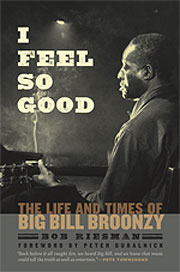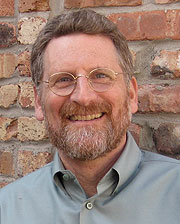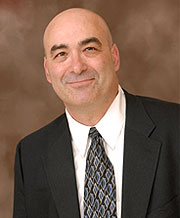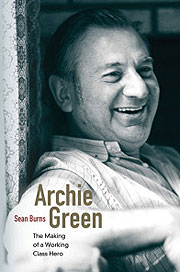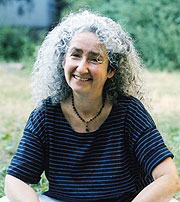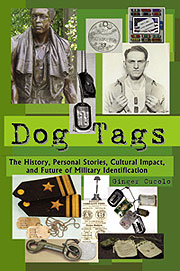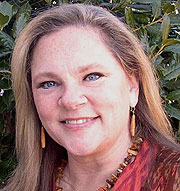| |
|||
|
2012 Botkin LecturesOnline Archive of Past Benjamin A. Botkin Folklife Lectures All of the materials from the Botkin Lectures are available to visitors in the Folklife Reading Room. Selected materials will be made available online as digital versions become available. Scroll down to see available webcasts and event flyer essays for the 2012 season.
November 16, 2012, 12:00 noon - 1:00 pm
|
|
|
I Feel So Good traces Big Bill's career from his rise as a nationally prominent blues star, including his historic 1938 appearance at Carnegie Hall, to his influential role in the post-World War II folk revival, when he sang about racial injustice alongside Pete Seeger and Studs Terkel. Riesman's account brings the reader into the jazz clubs and concert halls of Europe, as Big Bill's overseas tours in the 1950s ignited the British blues-rock explosion of the 1960s. Interviews with Eric Clapton, Pete Townshend, and Ray Davies reveal Broonzy's profound impact on the British rockers who would follow him and change the course of popular music.
Bob Riesman is co-editor of Chicago Folk: Images of the Sixties Music Scene: The Photographs of Raeburn Flerlage. He produced and co-wrote the television documentary American Roots Music: Chicago, and was a contributor to Routledge's Encyclopedia of the Blues.
August 9, 2012, 12:00 noon - 1:00 pm
Mary Pickford Theater, 3rd Floor, James Madison Building
|
|
Campus Traditions: Folklore from the Old-Time College to the Modern Mega-University, presented by Simon J. Bronner, Pennsylvania State University
From their beginnings in American history, College campuses emerged as hotbeds of expressive traditions fitting under the rubric of folklore (although scowling critics would dismiss these traditions as high jinks). This became more true, rather than less, as universities have become engines of mass society. Rather than deride campus traditions as cases of boys and girls "gone wild," Bronner interprets the uses of play and ritual for students in different eras to work through tough issues of their age and environment. More broadly, campus traditions are shown to function centrally in the development of American culture.
Simon J. Bronner is Coordinator of the American Studies Program and Director of the Doctoral American Studies Program and Distinguished Professor of American Studies and Folklore at Pennsylvania State University. He received his Ph.D. in Folklore and American Studies from Indiana University in 1981. He became editor of the Encyclopedia of American Studies in 2011. He is the editor of a book series entitled Material Worlds and edits the journal Jewish Cultural Studies. He is the author of many books, including Explaining Traditions: Folk Behavior in Modern Culture (2011); American Children's Folklore (2006, winner of the Opie Prize for best book on children's folklore); Grasping Things: Folk Material Culture and Mass Society (2004); Folk Nation: Folklore in the Creation of American Tradition (2002), Following Tradition: Folklore in the Discourse of American Culture (1998); Piled Higher and Deeper: The Folklore of Campus Life (1990); and American Folklore Studies: An Intellectual History (1986). For more information, visit Simon J. Bronner's blog.![]()
|
|
July 12, 2012, 12:00 noon - 1:00 pm
Mary Pickford Theater, 3rd Floor, James Madison Building
Squeeze This! A Cultural History of the Accordion in America, A book talk by Marion Jacobson.
Polka, zydeco, and "Lady of Spain": If this is your idea of the only genres wherein the accordion flourishes, prepare to be enlightened by the history of this robust instrument's odyssey across the American musical landscape and its dramatic rise, fall, and rise again in twentieth-century popular culture.
Marion Jacobson is an ethnomusicologist, author, and educator who has written hundreds of reviews and features of live concerts and events of the major world music traditions from Indian ragas to Cajun/Zydeco for The Washington Post, Stereo Review, and dozens of music magazines and blogs. Dr. Jacobson earned her PhD in ethnomusicology from New York University in 2003, and has taught at NYU, SUNY New Paltz, and the Albany College of Pharmacy and Health Sciences. She began digging for the fossilized remains of lost American accordion cultures in New York City. Grants from the American Philosophical Society and the Mellon Foundation allowed her to continue excavations in the vibrant accordion centers of Houston, San Antonio, the Twin Cities, and the San Francisco Bay Area, leading to Squeeze This! A Cultural History of the Accordion in America , the first comprehensive scholarly book on the piano accordion, published by University of Illinois Press in 2012.
June 26, 2012, 4:00 - 5:00 pm
Mary Pickford Theater, 3rd Floor, James Madison Building
|
|
Crafting Change: African American Folk Artists and the Civil Rights Movement presented by Patricia A. Turner, University of California, Davis.
Patricia A.Turner is the Vice Provost of Undergraduate Education and Professor of African and African-American Studies at the University of California, Davis, where she has been on the faculty since 1990. A nationally known folklorist, her scholarly interests include rumor, quilting, and media portrayals of African Americans. Dr. Turner's books include Crafted Lives: Stories and Studies of African-American Quilters (2009); Whispers on the Color Line: Rumor and Race in America with Gary Alan Fine; (2001); Ceramic Uncles and Celluloid Mammies: Black Images and Their Influence on Culture (1994) and I Heard It Through the Grapevine: Rumor in African-American Culture (1993). Her commentary on issues related to rumor and conspiracy theories—from Hurricane Katrina to 9/11 and the death of bin Laden– has been sought for print, radio and television media including the Washington Post, Wall Street Journal, Talk of the Nation, and All Things Considered, and the NBC Nightly News. Turner's recent New York Times op-ed on the film The Help was among the week's most visited and e-mailed stories. Active in national cultural/scholarly life on both coasts, she is leading UC Davis's participation in the 2012 Smithsonian Folklife Festival, and is a frequent panelist at San Francisco's Museum of the African Diaspora. Her interest in quilting both as a craft and as a rich historical narrative began at an earlier Smithsonian Folklife Festival. She is a collector of quilts crafted by African American women, and an avid quilter herself
May 1, 2012, 12:00 noon - 1:00 pm
Mary Pickford Theater, 3rd Floor, James Madison Building
|
|
Archie Green: The Making of a Working-Class Hero, a book talk by Sean Burns
Respected as one of the great public intellectuals of the twentieth century, Archie Green (1917-2009), through his prolific writings and unprecedented public initiatives, profoundly contributed to the philosophy and practice of cultural pluralism. For Green, pluralism was the life source of democracy — an essential antidote to authoritarianism of every kind. His activist and intellectual quest was fueled by a generative tension between the political ideologies that animated his life and helped shape his era — New Deal liberalism, anarcho-syndicalism, and pragmatism. This talk explores the relationship between his formative political experiences at home, at school, and at work during the "Age of the CIO" and his subsequent development of "laborlore" as a public-oriented interdisciplinary field. Green is best known for his spirited and unflagging lobbying of Congress in support of the American Folklife Perservation Act of 1976 — legislation that paved the way for the creation of the American Folklife Center.
|
|
In 2000, Green founded the Fund for Labor Culture and History. This talk will draw from the substantial oral histories that Burns recorded with Green — interviews which provide the foundation for Burns' biography, Archie Green: The Making of a Working-Class Hero (2011).
Sean Burns is a Berkeley, California-based writer, teacher, and musician. His primary research interests are in the culture and history of left social movements, particularly questions of how movements generate transformative social imagination and translate that vision into effective local-global initiatives. Burns leads the popular, indie-folk rock band Professor Burns and the Lilac Field.
Learn more about the life and work of Archie Green.
April 12 , 2012, 12:00 noon - 1:00 pm
Mary Pickford Theater, 3rd Floor, James Madison Building
|
|
"Reflections on Memory and History: Collecting New Oral Histories of the Civil Rights Movement for the LOC/Smithsonian NMAAHC," presented by Joe Mosnier.
A half-century on, what remains to be learned of the U.S. Civil Rights Movement? Plenty, it turns out. Last year historian Joe Mosnier, together with videographer John Bishop, journeyed to twenty states to interview fifty individuals who, most as teenagers or young adults, gave themselves over to the civil rights struggle. This testimony — urgent and immediate, but also refracted by memory and time — compels a fresh look at "the movement," confirming, upending, and reaching entirely beyond the considerations that define the received civil rights narrative.
Mosnier will share video excerpts, discuss emerging insights in relation to civil rights historiography, and offer brief personal reflections on the complex emotions engendered by the oral history experience for both interviewee and interviewer. Comments by the audience will be warmly welcomed.
These interviews are the first installment of a five-year national research initiative, the Civil Rights History Project, supported by an act of Congress and jointly led by the Library of Congress and the Smithsonian's National Museum of African American History & Culture. University of North Carolina, Chapel Hill's Southern Oral History Program, a national leader in academic oral history research, leads this research under contract.
Joe Mosnier is the Lead Field Investigator and Project Manager for the Civil Rights History Project, a national oral history initiative of the Smithsonian's National Museum of African American History & Culture in partnership with the Library of Congress. Joe earned his Ph.D. in 20th-century U.S. history at the University of North Carolina, Chapel Hill. He has worked in academic oral history for more than fifteen years, including as Associate Director of UNC-Chapel Hill's Southern Oral History Program. He has led major oral history studies on civil rights, gender, political, economic, institutional, and community history themes. With a co-author, he is presently completing a book on civil rights attorney Julius Chambers and the NAACP Legal Defense Fund's national litigation campaign c. 1964-1975.
March 29, 2012, 1:00 PM - 2:00 pm
Mumford Room, 6th floor, James Madison Building
|
|
"My Father, My Partner," presented by Nora Guthrie.
(webcast forthcoming)
Nora Guthrie is the daughter of Woody Guthrie and the Director of the Woody Guthrie Archives. For the last twenty years, she has worked with her father's collection to support ongoing research and to create new works from the vast legacy he left behind. In this program, she will recount her early recollections of family life (which include family gatherings and hootenannies with musicians close to the family), Woody's hospitalization with Huntington's Disease, her recognition of her father's growing mythology among artists in the 1960s folk music revival, and the gradual transition of her relationship with Woody into one of professional partnership. Her thoughts on Woody's political, social, and spiritual teachings, and how they come into play in today's world, will be part of the conversation.
For information about Woody Guthrie materials at the American Folklife Center, Library of Congress, see Woody Guthrie Collections in the Archive of Folk Culture, compiled by Todd Harvey and Rachel Howard.
For more information about Woody Guthrie, visit the Woody Guthrie Centennial Website, 1912-2012.![]()
January 26, 2012, 12:00 noon - 1:00 pm
Mary Pickford Theater, 3rd Floor, James Madison Building
|
|
Dog Tags: History, Stories & Folklore of Military Identification
a book talk by Ginger Cucolo
[No flyer essay was prepared for this talk]
View the webcast Running time 01:04:00
The one hundredth anniversary of the official use of American personal identity tags, affectionately known as "dog tags," recently passed without fanfare. Dog tags are highly personal items to warriors of every service and to their families as well. Each dog tag carries its own human-interest story. The acts of receiving the dog tag, hanging it around the neck, and feeling it against the body constitute a silent statement of commitment. The tag itself individualizes the human being who wears it, despite his or her role as a small part of a huge and faceless organization. While the armed forces demand obedience and duty to a higher cause, dog tags, hanging under service members' shirts and close to their chests, remind them of their individuality. They bring comfort and help calm the fears of soldiers facing death: "I do not want to be forgotten; I do not want to become an 'unknown.'"
|
|
Understanding and sharing the history of dog tags and their deeply personal meanings in today's world is at the core of this book.
Ginger Cucolo is married to a career infantryman with thirty-two years of active-duty service. His dog tags have forever been a part of his extended self. She is the daughter, daughter-in-law, sister, and niece of servicemen. She holds a bachelor's degree in history from the University of Texas, and a master of science degree from California College for Health Sciences. For more information, see her website Dog Tag History ![]()
| ||||

